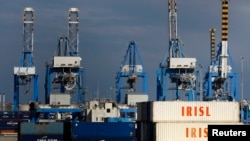The seven Iranian prisoners the United States agreed to swap Saturday for four Americans all were accused or convicted of violating economic sanctions against Iran aimed at forcing it to abandon any effort to build a nuclear weapon.
The U.S. said six of the seven held dual U.S.-Iranian citizenship and several of them had lived in the United States for years before drawing the attention of U.S. authorities who were investigating trade deals with Iran that were banned by the sanctions.
In addition, as part of the prisoner swap, the U.S. agreed to dismiss charges and end its alert notices with the international police agency Interpol against 14 other Iranians whom it believed it would not have been successful in extraditing to the U.S. for trial.
One of the seven Iranians freed was Nader Modanlo, a naturalized U.S. citizen who was born in Iran and is now in his mid-50s. He was the principal owner of an aerospace company outside Washington and was convicted of helping broker a deal that led to Iran's first orbiting satellite, a launch carried out in Russia in 2005.
Modanlo was convicted of violating the trade embargo, money laundering and obstruction of bankruptcy proceedings in 2013 and was serving an eight-year prison term, on top of being ordered to forfeit $10 million to the U.S. government.
A year ago, another of the Iranians, Ali Saboonchi, was sentenced to a two-year prison term for conspiring to violate the trade ban and seven counts of exporting American-manufactured industrial products to Iran. According to testimony at his trial, Saboonchi shipped the products to companies in China and the United Arab Emirates that then sent them on to Iran.
Cyber attack case
Nima Golestaneh was in a U.S. jail awaiting sentencing after pleading guilty last month of helping carry out a cyber attack on a U.S. defense contractor.
Another of the jailed Iranians freed Saturday, Arash Ghahreman, had won a visa lottery to enter the United States in 2006 and settled in his new homeland, obtaining U.S. citizenship and working at a shipyard in New York. But U.S. prosecutors said he ran afoul of the trade sanctions with a plan to export electronics to a Dubai company operated by a friend, knowing they would be shipped on to Iran. He is appealing his conviction and a 6½-year prison term, saying he did not know the items were destined for Iran.
The other three Iranians, Bahram Mechanic and Tooraj Faridi, both of Houston, and Khosrow Afghahi of Los Angeles, were charged in a 24-count indictment last year with exporting $24 million worth of electronics to Iran that Tehran could have used in a range of military systems, including surface-to-air and cruise missiles.
It was unclear whether the seven would leave the U.S. for Iran, but they are free to stay in the United States.




